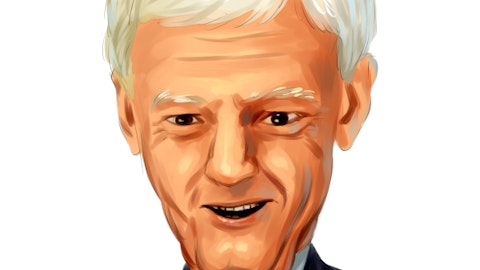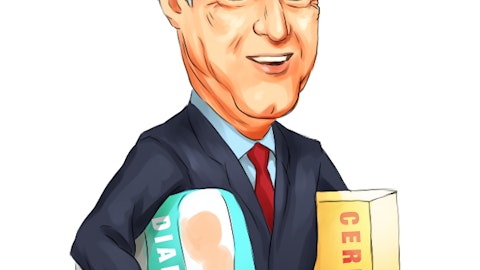But on the other side, things like the SAG strike, things like the continued increase in cost of scripted content do make sports still a very desirable place to be and the place where scale can be reached. So there are a bunch of counter-growing trends that are — make me on the whole market, but still very bullish on F1.
Benjamin Swinburne: Is Europe tougher than the U.S.? How would you compare those?
Gregory Maffei: I think the reality is most of the trends that are negative are further along in the U.S. than in Europe. But a lot of cases, Ben, as you know, the — how would sports rates get bid? Largely a function of which distributor in the market needs the product or wants the product and it could be a market where there are multiple bidders you’re going to do very well, and where there are fewer bidders, you will do less well. And that may almost be unrelated to what is going on in the market in that particular geography.
Operator: Our next question comes from the line of Bryan Kraft with Deutsche Bank. Please proceed with your question.
Bryan Kraft: Good morning. I guess I wanted to ask a couple, if I could. Greg, what do you think the time-line will look like to reach an agreement with the Special Committee of Sirius, assuming you do reach one? And whether you just answered that question or not, I was wondering if you could maybe address the second one, which is if you do reach an agreement, once that agreement has been reached, what would be the key milestones and the probable timing to close the spin and merge? And then separately, I just want to ask you about Quint events. Once you close that acquisition, are there significant advantages to F1 from owning the asset? Or is it more of an opportunistic acquisition to pursue growth opportunities outside of F1?
Gregory Maffei: Okay. It’s a lot, Bryan. All right. Let’s start with — I already said I’m not going to comment on any further on the negotiations, timing or the like. If a deal is reached, I think it will be required a shareholder vote likely, the structure of — the shareholder in the LSXM side, the structure on the SXM side, given our high equity ownership and the structure of how they work their charter and bylaws will be quicker. But there will also be the typical regulatory SEC matters and FCC matters that likely have to be cleared. So I would still expect several months delay even post any deal that has made reached. On Quint, I think we’re excited about Quint for many reasons, and I’ll let either Stefano or Renee, who both have views add it.
But we’re excited because of what it can do for us. One of the trends that we are pushing forward in Formula One is understanding our customers better and really having a direct connection. And so many things that we are doing, whether it be the app or Las Vegas or Quint, allow us to better understand our customers and their needs and desires. And I think that’s a continuing trend you will see that will add power to the F1 ecosystem and allow us to do much more. Quint is important because of how they touch those customers are some of our best customers and how we can utilize their talents to grow and our understanding of our existing customer base, but also expand that customer base. The opportunity outside of F1 is also very interesting. I mentioned some of the places where they are at MBA, Churchill Downs.
We think there are many sporting events, many live events that could benefit from Quint-type experiences. And we think Liberty can be in a position potentially to help them reach out to some of those leagues and opportunities. So we’re excited both for what it can do for F1 and what we can help do together, hopefully in the outside world of sports. Stefano, do you want to add anything?
Stefano Domenicali: No. I think, Greg, that you touched exactly the point that is for Formula One, for sure. The need of understanding better our customer. And the growth of the request that we have in all around the world makes — it’s related to the experience, and this acquisition will allow us to talk with them better and to offer them better products and better things that will be — will enable them to be closer to our F1 world.
Bryan Kraft: Greg, if I could ask one follow-up just on the first one. I think you mentioned FCC is in Federal Communications Commission matters. I guess my understanding is there would be no HSR approval needed because you already have hard control. Is there an approval needed? How should we think about what the FCC’s role would be?
Gregory Maffei: My understanding is, is that — Renee, you want to go?
Renee Wilm: Yes. No, I’m happy to. It would be very much a pro forma application process, likely done within 45 to 60 days is what we’re expecting. I think the longer will be the SEC review, which to Greg’s point, should take a few months, I think maybe four to six months to get the entire thing done after we have an announcement.
Operator: Our next question comes from the line of Vijay Jayant with Evercore. Please proceed with your question.
Vijay Jayant: Thanks. A question on the Las Vegas race. I’m assuming that the OPCO is paying the holding company as a promoter, given Liberty Media spend money on the track and the land sort of a promotion fee. So when — Greg, when you talk about the profitability of the Vegas race, are you assuming that includes arguably that payment to the OPCO — from the OPCO to the holdco? Or is it at the operating company, the profits you’re sort of expecting from the race?
Gregory Maffei: Well, Vijay, you’re correct that there is that relationship. I think we are talking about the totality, but also, I think, over time, how the OPCO will be a very profitable race as well. So I think you can look at it both ways.
Vijay Jayant: And then just — Stefano talked about the attendance in all these races. Can you sort of confirm that the Vegas race is sold out on ticketing?
Renee Wilm: Stefano, I’m happy to take that one. Vijay, it’s Renee. We have a handful of tickets left, and the demand coming in, in the last minute, which knowing Vegas is the last-minute market, we didn’t back — hold ticket for that purpose. So we are very excited, and we will be sold out by the time of the event.
Gregory Maffei: Los Angeles for Las Vegas relatively late, which is part of the war strategy.
Operator: Our next question comes from the line of Stephen Laszczyk with Goldman Sachs.




